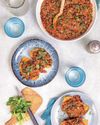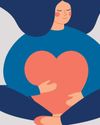
As I navigated the familiar route to pick up my son from nursery, the routine act of checking my -physical blind spots sparked an unexpected line of thought. How many times had I glanced over my shoulder, ensuring safety on the road without a second thought? Yet, in that moment, I found myself pondering the unseen areas of my life, the emotional blind spots that, much like those in my car, might be keeping me safe but also limiting my perspective.
It was a simple drive, yet it led me to a profound realisation - just as my car's blind spots exist to protect me from harm, could there be daily habits and mental patterns acting as my emotional blinkers? Was I unconsciously operating with tunnel vision, focused solely on reaching my metaphorical destination unscathed? The more I reflected, the more I wondered: what aspects of my life had I been overlooking, unintentionally keeping myself confined to a smaller version of what could be?
If I'm honest, it wasn't actually a small life I was afraid of; it was stepping into the fullness of who I could be, and trusting in what I had to offer. I work to present the most confident, positive version of myself, but in truth, I'm often plagued by self-doubt in unknown situations.
Self-doubt, fear of failure, and imposter syndrome can significantly hinder personal growth and success in various aspects of life, according to therapist and author Abby Rawlinson. 'These insecurities can sometimes cause people to live in overdrive, where they do more than is necessary and more than is healthy, driven by a fear of failure or being unmasked as fraudulent,' Rawlinson explains. "They work long hours, frantically people-please, and obsessively over-prepare for things, just to avoid feeling like they're falling short,' she adds.
Bu hikaye Psychologies UK dergisinin June 2024 sayısından alınmıştır.
Start your 7-day Magzter GOLD free trial to access thousands of curated premium stories, and 9,000+ magazines and newspapers.
Already a subscriber ? Giriş Yap
Bu hikaye Psychologies UK dergisinin June 2024 sayısından alınmıştır.
Start your 7-day Magzter GOLD free trial to access thousands of curated premium stories, and 9,000+ magazines and newspapers.
Already a subscriber? Giriş Yap

Why Are We So Sensitive About Being Sensitive? - Feeling empathy, energy and emotion keenly is not a failing - it can be your strength and your superpower, discovers Yasmina Floyer
All of us are sensitive - it is the very nature of being human. However, as with most behavioural characteristics, it exists on a scale. Jenn Granneman, founder of the world's largest community for introverts and co-author, along with Andre Sólo, of Sensitive (Penguin, £10.99), tells me about the characteristics of someone who is highly sensitive: 'Simply put, if you're a highly sensitive person, your body and mind respond more to the world around you. You respond more to heartbreak, pain, and loss - but you also respond more to beauty, new ideas, and joy. You're more affected by everything around you, but you also draw more from these experiences.

Try a Little Kindfulness - Make kindness a conscious practice and infuse your life with everyday abundance, writes Dr David Hamilton
The more we care about others, the more we realise that most people are just like us - trying to figure things out and hoping for a good day. It's easier to fear what you don't know, but once you get to know people, the world seems a lot smaller and cosier. So next time you're tempted to scroll past someone's problem, dismiss someone's feelings, or just be in your own little bubble, remember: the world's a better place when we all give a little f*ck. Let's sprinkle that stuff everywhere like it's magical kindness glitter!

There's No Excuse to Slow Down! - Presenter, podcaster and author Gabby Logan talks to Psychologies about health, happiness, and overcoming hurdles in midlife...
Presenter, podcaster and author Gabby Logan talks to Psychologies about health, happiness, and overcoming hurdles in midlife...When TV presenter Gabby Logan started to experience brain fog in her late 40s, struggling to recall the correct word or name on live TV, she initially put it down to tiredness. 'I couldn't quite get that name or articulate in the way I had previously been able to, so I was concerned, but it coincided with lockdown and not doing any telly for a while. I remember feeling quite nervous going back to live TV.' But the former international gymnast soon realised that it was a symptom of perimenopause and promptly went onto HRT, which she says has balanced her hormones.

Kindle your creativity
Increase your sense of connection and support your self-expression, urges Caroline Butterwick

Fast and filling!
Join the high-protein revolution and eat better everyday, with these full-of-flavour recipes from nutritionist Scott Baptie's new cookbook

What's your optimum?
Eating well can cure what ails us, so why is it so hard? Anna Blewett discovers the secrets to a more resolved relationship with food...

"FRIENDSHIP DELIVERED SO MUCH OF WHAT ROMANTIC LOVE HAD PROMISED"
Author Marianne Power talks to Psychologies about self-love and the sisterhood...

Summer break or make!
Hello, lovers! September is here, and the lazy holiday season is behind us. And for many-me included - now feels like the perfect opportunity for a personal kick up the backside, and to embark on a relationship reset. In my work, it's typically women who take the first steps accessing couples' help, but recently (and encouragingly) I've noticed an uptick in men reaching out to get relationship advice and wanting to put the work in.

Time to spread their wings
As the seasons shift and shudder, threatening rhythm and routine, Heidi Scrimgeour embraces September in all its bittersweetness...

Big wild world
Caro Giles fills up her cup with summer colour and awaits autumn wonder...